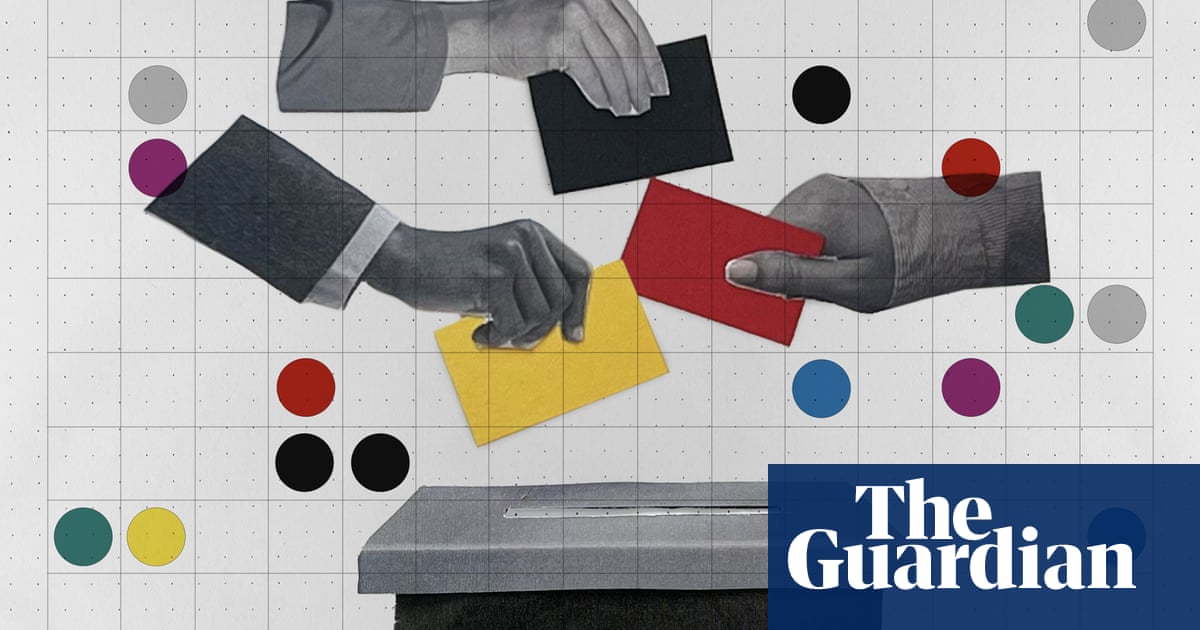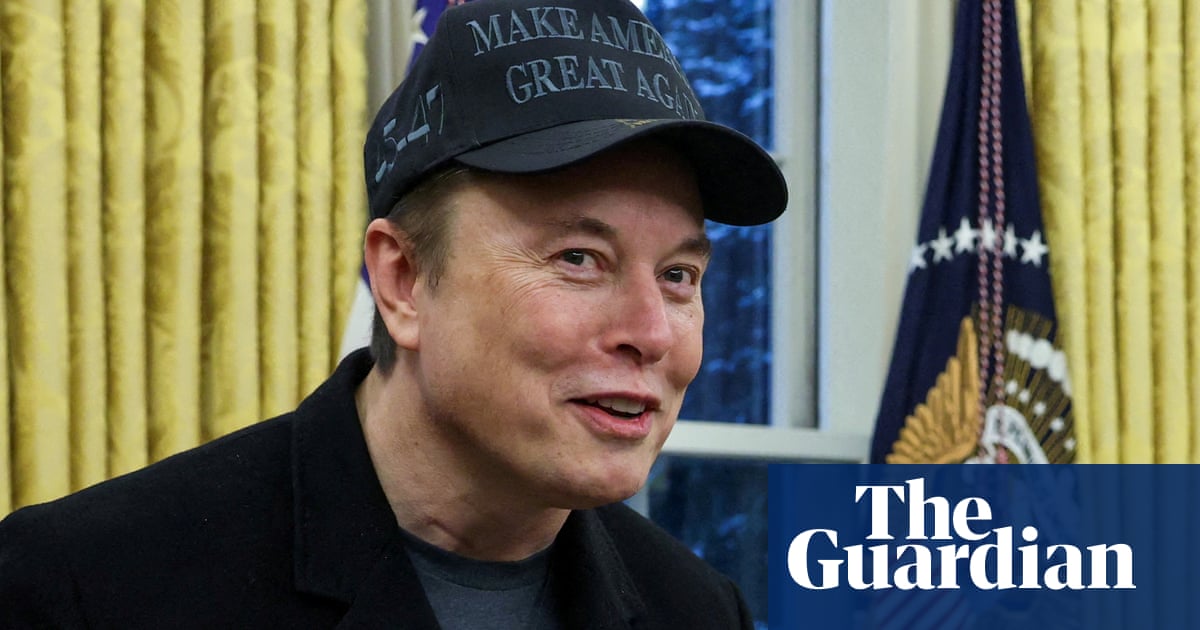Introduction: Euro hits one-month high after German election
Good morning, and welcome to our rolling coverage of business, the financial markets and the world economy.
The euro has rallied this morning as European investors express relief over the outcome of Germany’s election – although this is mingled with anxiety over a slump on Wall Street at the end of last week.
The euro has climbed to a one-month high, after the centre-right CDU/CSU alliance came top of the German election, with 28.5% of the vote, meaning CDU leader Friedrich Merz will become Germany’s next chancellor – once he has agreed a coalition.
A grand coalition – with the SPD, which fell to third place with 16.4% – seems likely.
That would keep the far-right AfFD (20.8%) in opposition.
This has lifted the euro up t0 $1.0528 against the dollar, the highest since 27th January.
The single currency is also a little stronger against the pound, at almost 83p.
Germany’s main stock market index, the DAX, is on track to jump almost 1% at the start of trading.
Analysts are hoping that the path to economic recovery, after several tough years for the German economy, could now be easier.
Kathleen Brooks, research director at XTB, explains:
This is a pivotal election for Germany, and it comes at a fragile time for the country as it battles economic malaise and domestic friction. A coalition between the two biggest German parties could be the most fruitful from an economic policy standpoint, since it may make it easier for Germany to reboot economic growth after 2 years of economic contraction.
The best way to do this is to ease restrictions on government borrowing to help spur the economy back to life. This will be much easier if you have the main parties as part of the coalition.
But, Germany would have to relax its ‘debt brake rules’ before it can radically increase borrowing – and there may not be enough support for such a move in the Bundestag.
Holger Schmieding of Berenberg points out that the AfD (152 seats) and The Left (64 seats) have won more than one third of the 630 seats and can thus veto any changes to the constitution.
Schmieding suggests this gives the “populist fringe” a fiscal veto”
AfD and The Left have little in common. But both these populist protest parties oppose aid to Ukraine. Most likely, the new government will not negotiate a change to the constitution (or any other issue) with the AfD.
Getting The Left to agree to a debt brake reform that is primarily needed to raise defence spending including more help for Ukraine could also be very difficult. The Left would like to ditch the debt brake. However, its agenda (soak the rich, spend more on welfare and less on defence) is the very opposite of the Merz agenda. Never say never, but finding room for compromise would be an uphill struggle, to put it mildly.
Our main German election liveblog will have full coverage of events today:
Elsewhere, traders are digesting Friday night’s drop in share values on Wall Street, after the latest survey of purchasing managers showed a slowdown in US company growth.
The S&P 500 sank 1.7% on Friday, for its worst day in two months.
The agenda
-
9am GMT: Bank of England’s 2025 BEAR Conference opened by deputy governor Clare Lombardelli
-
9am GMT: German IFO business confidence survey
-
10am GMT: eurozone inflation (final) for Jan
-
11am GMT: Bundesbank monthly report
-
6pm GMT: Speech by BoE policymaker Swati Dhingra at the Birkbeck Centre for Applied Macroeconomics ‘Bracing for turbulence: UK inflation and prospects for monetary policy’
Key events
Defence stocks rally
Shares in some European weapons makers are rising in early trading too.
German tank maker Rheinmetall jumped 3% at the start of trading, while in London BAE Systems are up 1.7%.
This comes after Germany’s Friedrich Merz pledged to achieve “independence” from the United States, and to strengthen Europe, after winning the German election. That could herald a further increase in defence spending….
Hopes that last night’s victory by the CDU/CSU could help pull Germany out of economic stupor and help bolster collective defence, has lifted investor spirits today, reports Susannah Streeter, head of money and markets at Hargreaves Lansdown:
‘’A dose of more certainty has been injected into European politics, with the Germany’s Conservatives winning the elections. It comes at a crucial time for the continent. Three years on from the invasion of Ukraine, high stakes deal making between the US and Russia continues, Ukraine is out in the cold and the outcome will have huge implications for security in Europe.
There is a dawning realisation that European nations will have to pull together and present a more united deterrent force, and Friedrich Merz, the CDU leader, is reading from that script. He has pledged to relax fiscal rules, to increase defence spending and inject the economy with much needed investment. But while Merz seems determined to ease off the so-called debt brake, which limits annual borrowing to 0.35% of GDP, it won’t be straightforward, because he will need a two-third majority in parliament.
However, with Russia’s aggression set to stay an unrelenting black cloud, the recognition of the need to contribute more to NATO’s budget may see political factions pull together.
German carmakers rally
Shares in Germany’s auto industry giants are higher in early trading.
BMW jumped 2%, while Volkswagen gained more than 1.6%.
In other sectors, Deutsche Bank’s shares are up 1.2%, while software giant SAP are 0.44% higher.
MDAX index up 1.4%
Smaller German company stocks have also opened higher.
The MDAX index, which tracks medium-sized firms listed in Frankfurt, has jumped by 1.4% in early trading.
Germany’s DAX rallies after election results
Germany’s blue-chip share index, the DAX, has jumped by more than 0.7% at the start of trading, as traders react to last night’s election results.
After a slightly slow open, the DAX gained 160 points to 22,448 points.
Jochen Stanzl, chief market analyst at CMC Markets, says investors welcome the prospect of a grand coalition in Germany, between the CDU/CSU and the SPD parties.
Stanzl explains:
Investor speculation has proven accurate: weeks ago, they anticipated that the new elections would lead to a more business-friendly government in Germany. The DAX’s rise at today’s opening suggests that this expectation has been confirmed. It appears that Chancellor Friedrich Merz now needs just one coalition partner—the SPD—to form a government. A Grand Coalition is currently viewed as the favorite, as it signifies stability and continuity.
While the long-term performance of the DAX is primarily driven by the international competitiveness of its listed companies, the current political outlook provides an additional incentive. Investors believe that Germany may soon have a government capable of initiating new growth impulses, thus bringing an end to the disputes that characterized the previous three-party coalition under the Ampel government.
Stanzl cautions, though, that caution is warranted:
Despite the optimism, the recent trend of profit-taking that began in the last two weeks could continue. The robust gains in the DAX this morning largely hinge on the perception that a coalition between the CDU/CSU and the SPD is the least problematic in addressing current challenges. At the same time, US President Donald Trump is likely to abandon his relatively gentle stance toward the EU and Germany soon. Whether the new government in Berlin can effectively navigate its relationship with Trump will become clearer in the coming weeks.
Friedrich Merz now faces the significant challenge of addressing a multitude of issues—from stagnant economic growth and Russia’s war in Ukraine to the looming threat of a global trade war, which could further burden Germany’s struggling industrial sector. Promptly tackling these challenges will be crucial for the new government’s success.”
Just Eat Takeaway to be taken over in €4bn deal
There’s also takeover excitement in Europe this morning, with investment group Prosus announcing a bid for Just Eat Takewaway.com.
Prosus says it plans to create a “European tech champion” of food delivery, and has made an all-cash offer to buy Just Eat’s shares, currently traded in Amsterdam, for €4.1bn.
The deal comes two months after Just Eat delisted from the London Stock Market, after a turbulent few years in which it merged with rival Takeaway.com, then agreed to buy the US-based app Grubhub for $7.3bn, only to sell it four years later for just $650m.
Just Eat’s shares have fallen over 85% over the last five years, as the surge early in the Covid-19 pandemic has faded.
Germany’s MDAX share index, which contains medium-sized, domestically focused companies, is on track to jump 1.25% when trading begins this morning, Reuters reports.
Deutsche Bank: concerned that grand coalition would not have a constitutional majority
Analysts at Deutsche Bank are hopeful that Germany will benefit from a “more effective government coalition in the next four years”.
But, they are also concerned that a grand coalition between the CDU/CSU and the SPD would not have a constitutional majority (two-thirds of seats) even if it allied with the Greens.
Deutsche say:
This means that any constitutional changes, including to the debt brake, would rely on the support of either the Left or the AfD. We believe this could be seen as a negative by markets in terms of reducing the likelihood of a decisive fiscal regime shift in Germany.
From a corporate perspective, too, it will hardly be reassuring that the centrist parties lack a constitutional majority.
Deutsche also predict that the crucial issue of defence spending will play a key role in the upcoming coalition talks:
In our view, Europe’s challenged security architecture makes it highly likely for CDU/CSU and SPD to agree on higher defence spending in principle, especially if outgoing Defence Minister Pistorius takes a leading role for the SPD in coalitions talks.
The euro and the European equity futures are in the green this Monday morning on relief that the German elections didn’t bring major surprises, reports Ipek Ozkardeskaya, senior analyst at Swissquote Bank:
Merz’ CDU/CSU won the election with around 28.5% of the votes – a good result for the center right though slightly weaker-than-expected, Olaf Scholz’ SPD gained around 16% of support – as expected, while the AfD amassed 20% of the votes.
The kneejerk reaction is a swift rebound of the euro and the equity futures on hope of higher spending by the new German government would tackle the economic weakness of past years.
Introduction: Euro hits one-month high after German election
Good morning, and welcome to our rolling coverage of business, the financial markets and the world economy.
The euro has rallied this morning as European investors express relief over the outcome of Germany’s election – although this is mingled with anxiety over a slump on Wall Street at the end of last week.
The euro has climbed to a one-month high, after the centre-right CDU/CSU alliance came top of the German election, with 28.5% of the vote, meaning CDU leader Friedrich Merz will become Germany’s next chancellor – once he has agreed a coalition.
A grand coalition – with the SPD, which fell to third place with 16.4% – seems likely.
That would keep the far-right AfFD (20.8%) in opposition.
This has lifted the euro up t0 $1.0528 against the dollar, the highest since 27th January.
The single currency is also a little stronger against the pound, at almost 83p.
Germany’s main stock market index, the DAX, is on track to jump almost 1% at the start of trading.
Analysts are hoping that the path to economic recovery, after several tough years for the German economy, could now be easier.
Kathleen Brooks, research director at XTB, explains:
This is a pivotal election for Germany, and it comes at a fragile time for the country as it battles economic malaise and domestic friction. A coalition between the two biggest German parties could be the most fruitful from an economic policy standpoint, since it may make it easier for Germany to reboot economic growth after 2 years of economic contraction.
The best way to do this is to ease restrictions on government borrowing to help spur the economy back to life. This will be much easier if you have the main parties as part of the coalition.
But, Germany would have to relax its ‘debt brake rules’ before it can radically increase borrowing – and there may not be enough support for such a move in the Bundestag.
Holger Schmieding of Berenberg points out that the AfD (152 seats) and The Left (64 seats) have won more than one third of the 630 seats and can thus veto any changes to the constitution.
Schmieding suggests this gives the “populist fringe” a fiscal veto”
AfD and The Left have little in common. But both these populist protest parties oppose aid to Ukraine. Most likely, the new government will not negotiate a change to the constitution (or any other issue) with the AfD.
Getting The Left to agree to a debt brake reform that is primarily needed to raise defence spending including more help for Ukraine could also be very difficult. The Left would like to ditch the debt brake. However, its agenda (soak the rich, spend more on welfare and less on defence) is the very opposite of the Merz agenda. Never say never, but finding room for compromise would be an uphill struggle, to put it mildly.
Our main German election liveblog will have full coverage of events today:
Elsewhere, traders are digesting Friday night’s drop in share values on Wall Street, after the latest survey of purchasing managers showed a slowdown in US company growth.
The S&P 500 sank 1.7% on Friday, for its worst day in two months.
The agenda
-
9am GMT: Bank of England’s 2025 BEAR Conference opened by deputy governor Clare Lombardelli
-
9am GMT: German IFO business confidence survey
-
10am GMT: eurozone inflation (final) for Jan
-
11am GMT: Bundesbank monthly report
-
6pm GMT: Speech by BoE policymaker Swati Dhingra at the Birkbeck Centre for Applied Macroeconomics ‘Bracing for turbulence: UK inflation and prospects for monetary policy’
Article by:Source: Graeme Wearden












